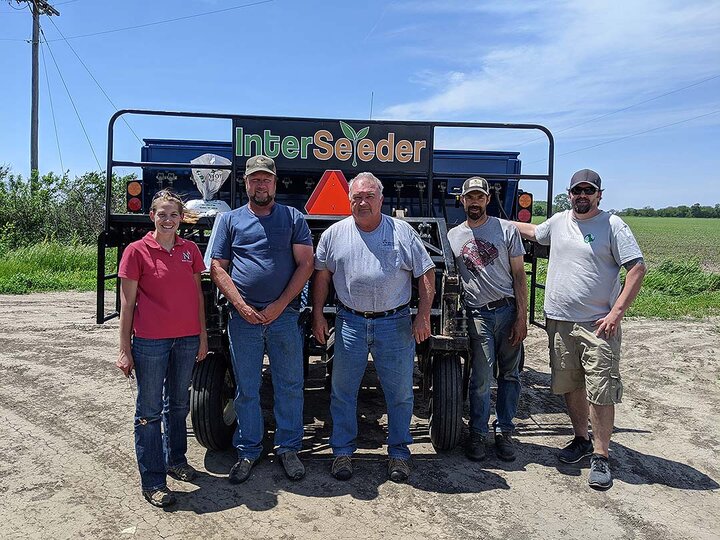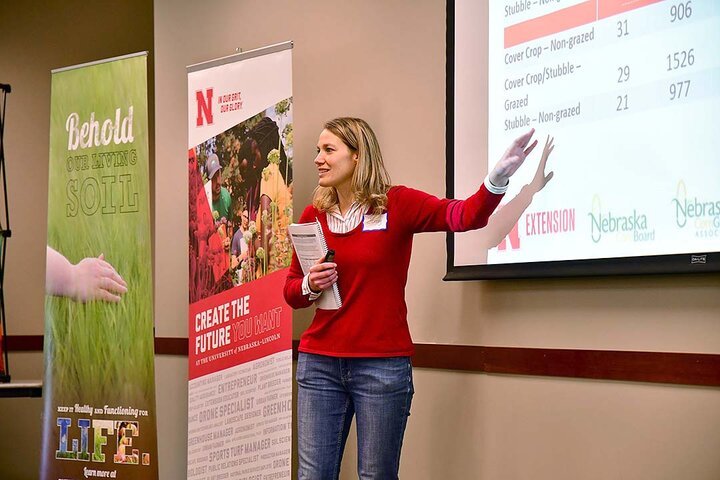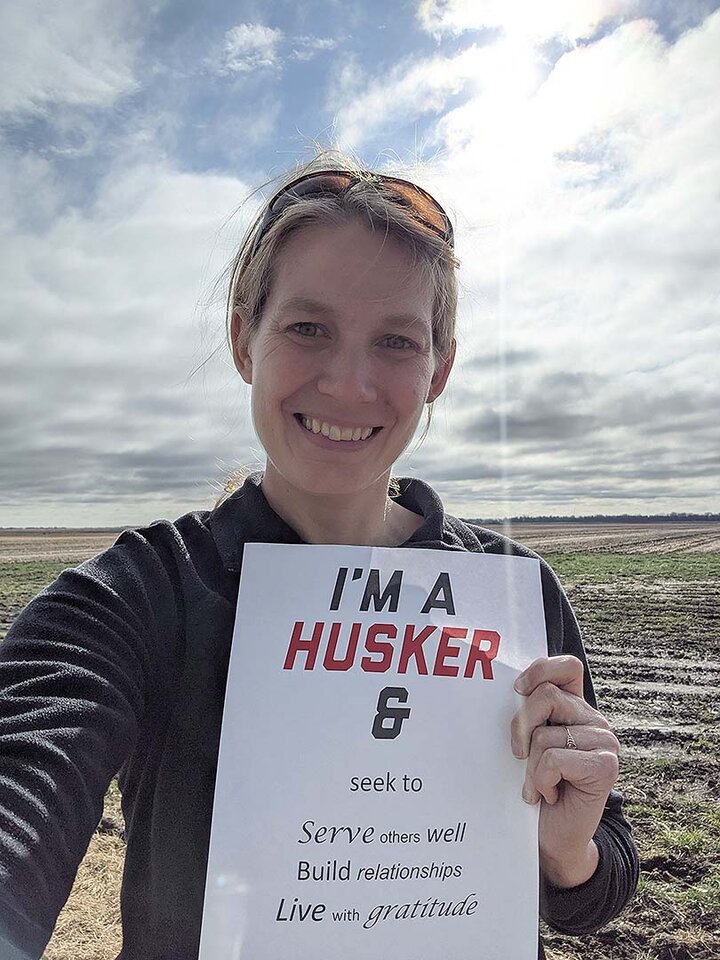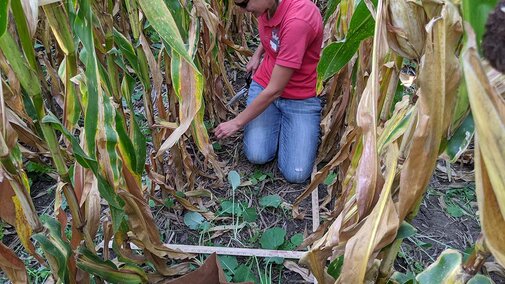“Digging into Extension” is a new CropWatch feature series that shines a spotlight on the professionals of Nebraska Extension. In each new installment, we will focus on a different educator or specialist throughout the state, highlighting their role in extension and services they provide to Nebraska farmers and ranchers. We hope you enjoy getting to know your local Nebraska Extension educators while reading Digging into Extension!
Her story begins the same as many others in agriculture.
She grew up on a small family farm in northeast Nebraska. They grew corn, soybeans and alfalfa, raised cattle and hogs. Agriculture was her lifeblood; she knew without a doubt that it was in her future. But it wasn’t until her many college internships that Jenny Rees realized her path was leading her straight to Nebraska Extension.

“What (the internships) taught me was that I enjoyed working with farmers, I enjoyed being outdoors and doing research, but I didn’t like selling things,” Rees said. “I wanted to be independent in what I said to people.
“I decided after the internships that I wanted to be a crop consultant. At the time, my advisor said, ‘Have you ever thought about extension?’”
That simple question opened her eyes to all the possibilities that extension promised in a career. She took her advisor’s sage wisdom and ran with it, becoming the first student to receive a customized extension-track graduate program in Plant Pathology at UNL.
Rees explained that the newly created program took her beyond the typical graduate school experience, allowing her to add real extension work onto the standard teaching and research appointments.
“I spent time in the diagnostic clinic, getting firsthand experience diagnosing programs that people sent in,” she said. “They also gave me the opportunity as a grad student to speak at extension events. Since then, more grad students have that opportunity, but it was new at that time.”
The innovative graduate program meant Rees received early and invaluable experience with extension, and it paid off in 2004 with her new title: “Extension Educator”.
Working in Extension
Originally assigned to Clay/Webster and now based at the York/Seward post, Rees spends her days applying her education from the farm, the classroom and in working with farmers in their fields to the ongoing research and information she offers to producers all over the state.
With her degrees in agronomy, crop protection and plant pathology, Rees said a niche she fills in Nebraska Extension is crop physiology. She seeks to observe what’s normal or abnormal about a plant and its growth, and what will happen to a plant if it’s damaged or compromised during a key growth stage.

Rees also leans heavily upon the systems approach methodology by which she was raised to find answers for her crop quandaries, such as determining causes for abnormal ear development and creating a forensic method for determining timing of off-target dicamba movement.
Aside from her work with farmers conducting on-farm research, Rees said her main job in extension is doing her level best to answer questions for producers. Sometimes, that requires donning a detective’s cap to sleuth for the cause of a mysterious crop condition. Other times, it requires the objective mind of a mediator to help resolve crop issues within the farm community.
“I am very honest,” Rees said. “If I don’t know the answer to the question, I tell them that. But I will find them someone who can answer it.
“We’re connectors. We’re connected to a lot of people — and we have the connections to help them solve their problems.”
She added that one of those connections is CropWatch. It’s an extension initiative that’s near and dear to Rees, beginning with her college days when she would pore over the CropWatch newsletter, saving her carefully collected copies in tidy binders for crop scouting. Years later — when she became a colleague of the very extension professionals she had admired for so long — her own academic articles began appearing in the newsletter.
Not long after that, she had a chance to help CropWatch evolve into what it is today.
In 2009, Rees became one of a trio of colleagues tasked by then-Nebraska Extension Dean Elbert Dickey to create a “one-stop shop for all crop-related information”.
“For years at (the formerly called) Crop Protection Clinics, constituent comments on surveys asked for one website to go to, instead of the numerous individual department and specialist websites,” Rees explained. “So, we decided that this one-stop shop needed to be rolled into what our constituents already knew and were asking for in CropWatch.”

The team spent 10 months putting together an expanded CropWatch website. Former CropWatch Editor Lisa Jasa built the website with IANR media, while Rees coordinated with 25 extension specialists and researchers to combine their individual sites into CropWatch, and former Extension Educator Gary Zoubek promoted the new website at Husker Harvest Days.
It was a team effort that served the mission of extension perfectly in the age of the internet — to offer timely, science-based information for all.
Twelve years later, their creation is still evolving, and Rees is still clacking away on her keyboard, typing up the latest findings of on-farm research projects and sending them hot to the digital CropWatch press. And she’s still happy that her path led to extension, as she walks the fields and talks to farmers, being a regular plant detective.
“I’m so blessed to have this career,” Rees began. “To work with so many wonderful farmers and people in the ag industry. To get to learn every day. To get to try things with grace to fail. To have the opportunity to help and serve others each day.
“I love my job.”
Jenny Rees is the water and integrated cropping systems extension educator for York and Seward counties. To connect with her, email jenny.rees@unl.edu, call 402-362-5508, follow her on Twitter @jenreesources or view her extension blog.

